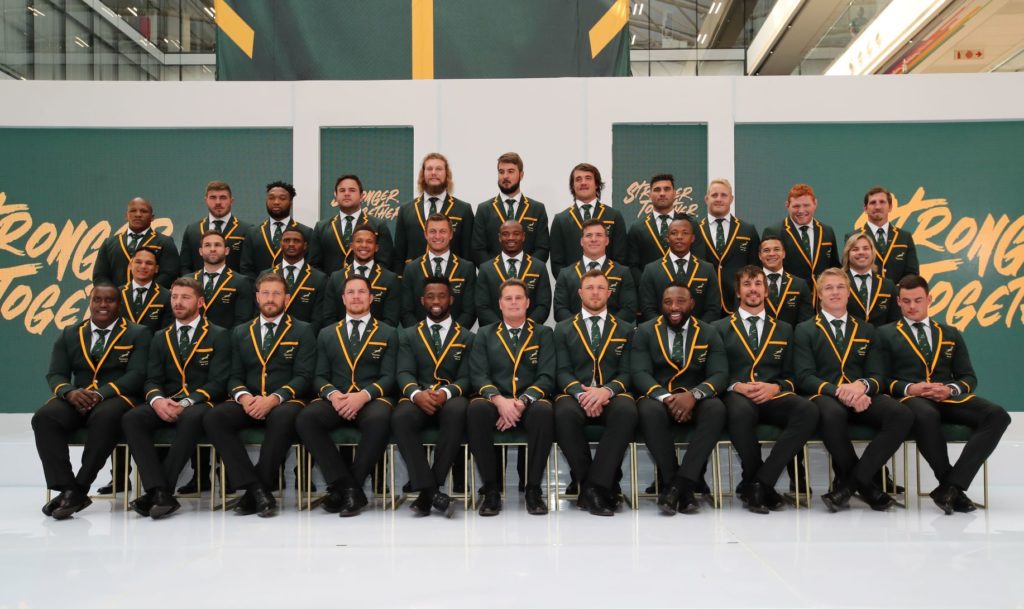JON CARDINELLI compares the balance between youth and experience in the 2019 World Cup squad with those that travelled to the 2015, 2011 and 2007 tournaments.
Rassie Erasmus has had less than two years to build a squad for the World Cup in Japan. While he has leaned on several veterans throughout the process, he has also backed a number of young and inexperienced players.
Following the announcement of the 31-man squad in Johannesburg on Monday, the Bok coach was asked if he was worried about the relative lack of experience in the group.
Eleven of the 31 have featured in fewer than 20 Tests, while half the squad (16) have never been to a World Cup tournament before.
‘I don’t think that we had the luxury of picking a very experienced team,’ Erasmus said. He then went on to highlight the pros and cons of having a more youthful squad.
‘I was involved in the 2011 campaign [as a technical advisor] when we had a really experienced team. What I learned is that what you have in experience you lose in availability and agility.
‘We always had six or seven guys sitting on the sideline with a hamstring or shoulder injury at the Monday training session. You couldn’t get a lot of numbers on to the park, so you couldn’t get the intensity up. On the other hand, when you got to the game on the Saturday, you had a lot of calm heads out there and some good decision-making.
‘In 2015, we also had a lot of experience. This year we’ve gone for a different approach,’ the Bok coach continued.
‘There wasn’t one day [in the past few months] when there was a guy sitting next to the field at training. All 35 or so were training. I believe that lifts the intensity of the session.
‘You take a bit of a risk [by not including as many veterans] and we won’t have as many players who have been in the big games before. Hopefully we can make up for it with our intensity.’
The table below comparing the current group with the past three World Cup squads makes for interesting reading.
The Bok team that travelled to the 2007 tournament actually had fewer Test caps on average (28) than the group bound for Japan (33).
EXPERIENCE OF BOK RWC SQUADS
| CAPS | 2019 | 2015 | 2011 | 2007 |
| 0-10 | 7 | 6 | 6 | 7 |
| 11-20 | 4 | 5 | 3 | 7 |
| 21-49 | 15 | 9 | 11 | 12 |
| 50-99 | 4 | 8 | 8 | 4 |
| 100 < | 1 | 3 | 2 | 0 |
| TOTAL | 1030 | 1297 | 1224 | 826 |
| AVERAGE | 33 | 42 | 41 | 28 |
Note: Stats accurate at time of RWC squad announcements. 30 players were selected in the initial squads in 2007 and 2011 while 31 were selected initially in 2015 and 2019.
Apart from Os du Randt, Victor Matfield, Percy Montgomery, John Smit and Albert van den Berg, the rest of the squad that travelled to the 2007 World Cup had fewer than 40 caps. A lot of those players went on to feature at the subsequent global tournaments in New Zealand and England.
The Boks averaged 41 caps in 2011 and 42 in 2015. They had 10 players with more than 50 caps in New Zealand and 11 with this kind of experience in England.
At the time of both tournaments, it was felt that the Boks were relying too heavily on experience and that there was not enough youth and pace in the team to balance the scales.
This time around, the Boks will have five players in the squad boasting more than 50 caps.
Eben Etzebeth (78) and Willie le Roux (55) were at the 2015 tournament. Francois Louw (68) and Beast Mtawarira (110) were at the last two World Cups.
Frans Steyn (60) last featured at a global competition in 2011, and was part of the side that triumphed in 2007.
As many as 15 members of the squad are in that middle group with 21-49 caps.
While captain Siya Kolisi (42), Jesse Kriel (44), Damian de Allende (39), Handre Pollard (41), Pieter-Steph du Toit (49), Lood de Jager (40) and Frans Malherbe (31) are all under the age of 30, they have been to a World Cup before.
If Erasmus’ senior players remain fit throughout the coming tournament, the Boks should maintain a healthy balance between youth and experience.
Photo: Samuel Shivambu/BackpagePix





